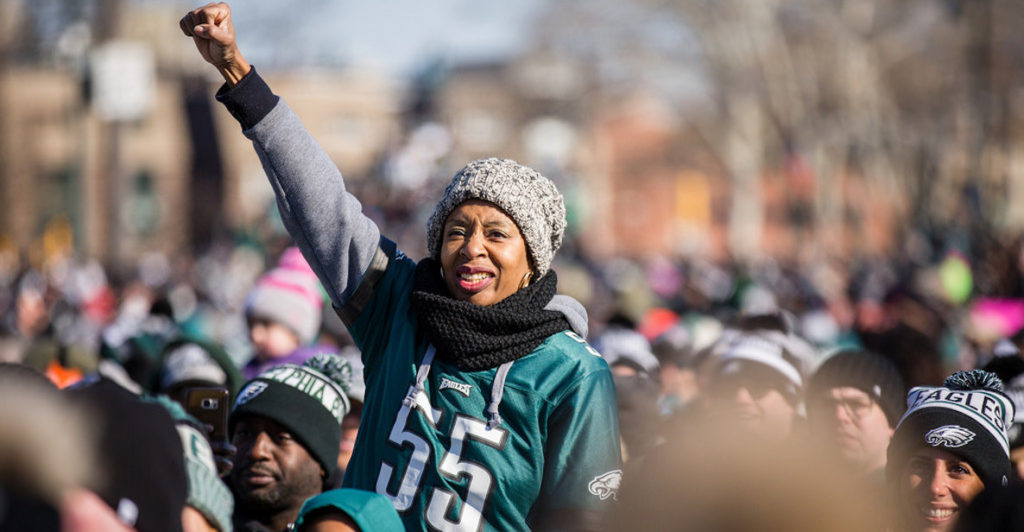Following in the tradition of Connor Barwin and Malcolm Jenkins, former All-Pro wide receiver and current Eagles broadcaster Mike Quick is writing weekly for The Citizen this season, analyzing what the Birds will have to do each week on the field to emerge victorious. We’ve paired Quick with Professor Richardson Dilworth, Director of Drexel University’s Center for Public Policy, who will analyze how Philly stacks up off-the-field against the city we play each week. Dilworth, who knows nothing about football, is arguably Quick’s most unlikely teammate ever.
Mike Quick’s On-Field Scouting Report: I’m feeling pretty positive about this week’s game, because it feels like the Eagles are starting to get their rhythm, like we witnessed last year. The needle feels like it’s pointed in the right direction.
This week, the Birds face a Panthers team that is very good at running the football. They’re among the top five rushing teams in the league. Quarterback Cam Newton is a big part of that. If the Eagles’ defense can keep him from running wild, they should be in pretty good shape.
Besides keying on Newton, the Eagles will have to be what we call “gap sound.” They’ll have to maintain gap security. That means that the linebackers and defensive backs will have to be disciplined about plugging the holes along the defensive line. If they try and do too much, Carolina wil run through the holes our defense leaves open.
When the Eagles have the ball, it will be important that our blockers block the second level players, the linebackers. Guys like Luke Kuechly and Thomas Davis are ball hawks—they have a way of getting to the football. So it’s important to block everyone, but against Carolina, it’s really important to neutralize their linebackers to effectively run the ball.
Finally, I’m hoping Professor Dilworth goes easy on my hometown this week. I grew up in Hamlet, North Carolina, and went to North Carolina State. So, Professor, show some love. Remember, North Carolina has become a banking capital!

Prof. Richardson Dilworth’s Off-Field Scouting Report: We beat Charlotte, where the Carolina Panthers play in our chart, but honestly, Mike is right: Charlotte has a lot going for it that is not reflected in these scores. For starters, in practically every “most livable city” index, Charlotte beats Philly. US News ranks Charlotte the 22nd best city in the country in which to live, while Philadelphia is ranked 98th.
The reason why is pretty much right in the scores: low crime, low poverty, relatively high salaries (median household income in Charlotte was $56K as opposed to $40K in Philly, 2012-2016) and not too expensive cost of living (for instance, median rent in Charlotte for 2012-2016 was only $23 more than in Philly). Also, Charlotte is growing much faster. Between 2010 and 2017 the population of Charlotte increased by approx. 17 percent (the city added more than 100,000 people) while in Philadelphia grew by 3.6 percent (or about 55,000 people).
One of the interesting things in the scores is the education ranking, namely the much larger proportion of the Charlotte population that has bachelors degrees. At the same time, institutions of higher ed are way more prominent here. Penn, Temple, and Drexel are all among the 10 largest employers in the city. In Charlotte, there are no colleges or universities among the top employers. Among the top employers in Charlotte you have a lot of banks, healthcare systems, some corporate headquarters and, of course, Walmart (the Charlotte list is for the metro area, I realize, and not the city proper, but I still think the comparison is accurate).
This difference in city employers is related to education levels in different ways. First, Charlotte has a higher percentage of people with bachelors degrees but Philly actually has a higher percentage of people with doctoral degrees. (The percentage difference is small, about .5 percent, but given the overall low number of people with doctorates the absolute number difference will be pretty big). So in some respects Philadelphia is more educated, though uniquely and more unequally so—appropriate for a place that is far more a college town.
The greater percent of folks with bachelor degrees most likely reflects more corporate, white collar jobs in Charlotte, which is appropriate for a corporate services town. It also reflects the fact that the issue of education levels in Philadelphia is one of retaining the folks who graduate from schools here (a perennial source of anxiety, but something that is apparently going pretty well), while for Charlotte most of the college graduates are coming from out of town.
So, in some respects I would rather be Charlotte because they apparently have a local economy that is attracting lots of educated workers. At the same time, my hunch is that the city is attracting those workers to pretty boring corporate jobs. By contrast, as a big university town, Philadelphia may well have more potential for innovation as an economic driver.
And finally, I just like the fact that one of the apparently cooler neighborhoods in Charlotte is named Dilworth.



